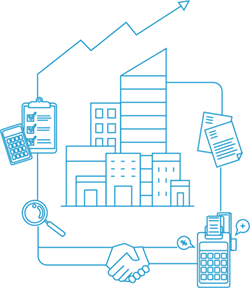From humble beginnings in the 1960s as a sideline business, selling manure and topsoil from a poultry farm, Parklea Sand & Soil has grown to one of the biggest specialist building and civil engineering materials suppliers and haulers in NSW.
The firm sells and moves a range of materials including sand, soil, gravel, road resources and cement from one end of metropolitan Sydney to the other using a fleet of 40 trucks. But until quite recently, it was a paper – and human memory–based business.
“That’s the way we’d always done it,” says sales manager Mitchell Schembri, a member of the third generation of his family to help run Parklea.
“We always felt that that was how we knew our business, like the backs of our hands.”
But the third generation had reservations about the tried-and-true business methods, Schembri says.
“Even five years ago, everything was paper-based, and we – the younger generation coming through – felt that we really should automate what we could, because we were convinced that we could be more efficient. The paper-based system – and the knowledge in people’s heads – worked, but we knew it could work better.”
In 2016, Parklea moved on to Allotrac, a transport management software program designed specifically for small and mid-sized freight and logistics businesses, to help them manage their fleet operations. The next step was to move to a cloud-based accounting platform: Schembri chose Xero. He engaged RSM to install Xero, and get it to work with Allotrac.
“Allotrac is designed to integrate with the major accounting systems, but we needed Xero to be tailored to our system and needs, which are unique,” he says. “RSM effectively built a customised bridge between our accounting system and Allotrac.”
The combined systems allow Parklea to manage jobs, drivers and vehicles in real time, with deliveries recorded instantly and clients’ receipts and invoices sent by email. 
The system takes orders and generates quotes, remembering regular and repeat orders for certain customers: manual adjustment is simply entered. Jobs are allocated into a timeslot that best suits Parklea, and get allocated to the most appropriate drivers, who receive the job information on their tablet. All the fleet inputs – including fuel, servicing and tyres – are tracked.
“The main thing that our system does is save us time, and time is our most valuable asset,” says Schembri.
“Our biggest thing is service: we pride ourselves on getting a delivery out within 90 minutes to three hours, so every minute is crucial when you’re going from one end of Sydney to the other. The system has completely streamlined the way we run the fleet. Say we save five minutes here on taking the order, five minutes there in allocating the load, one minute in loading the truck and one minute in assigning the job to a driver, there’s 12 minutes. That might not sound like much, but we have 40 trucks running, so times that by 40 – and straight away you can see how much you’ve streamlined things.”
The result is a “noticeable impact on the bottom line”, says Schembri. “Every truck is more efficient, and we get more jobs done each day. On the accounts side, account customers are about 70% of our business, and automated invoices and reminders for overdue accounts help cashflow enormously.
“When you’re flat out, you don’t look at those things, because you’re so busy all the time. But this year, the construction materials industry is struggling, and you can see where it saves us actual money. At the moment, our system is really helping us get through some tough times.”
RSM has also helped in this area, too. “They help us strategise on how to save more time, and they’re very good at monitoring our system, too,” says Schembri. “They have access to the back-end of our system and they will identify more efficient ways of doing things. For us it is all about freeing up time, and allowing us to do a lot of hands-on things – and to do them better.”

